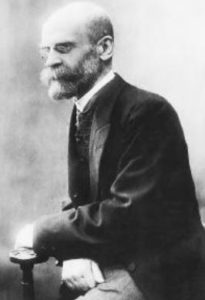The Father of Sociology

Émile Durkheim
David Émile Durkheim (1858-1917) was born in the French region of Lorraine to Orthodox Jewish parents. His father and grandfather were both rabbis, and Durkheim spent his early years in yeshiva intent on becoming a rabbi as well. Eventually, he decided to switch his career path and break out on his own. He went off to study psychology and philosophy. At 21, on his third application attempt, he was accepted to ENS, the most prestigious graduate school in Paris. Durkheim wanted to apply what he learned to explain society and social behaviour. At the time, however, there were no sociology studies anywhere in France. In 1885 he moved to Germany to work alongside some of the first sociologists. Two years later, Durkheim’s papers had become famous across Europe, and he was invited back to France to teach sociology at the University of Bourdeaux. Durkheim taught the first social science course in French history, and was also asked to reform France’s school curriculum. Over the next few years, Durkheim published a series of manifestos outlining exactly what social science is, and why it is important. He showed how the scientific method could be rigorously applied to this new field, and how it was distinct from related subjects. In 1895, he established the first university social science department, and in 1898 founded the first sociology academic journal. For these reasons, Durkheim is often called the “father of sociology”. His work is also credited with pioneering the field of criminology, and influencing psychology and philosophy as well. In 1902, Durkheim was appointed Chair of Education at the world-famous Sorbonne, and later became the only professor whose courses were mandatory for all students. Meanwhile, he served as advisor to France’s Minister of Education. Unfortunately, World War I had a devastating effect on Durkheim. Right-wing nationalists attacked him for not being “patriotic” enough, for being too liberal, and for being Jewish. Worse, many of his students were conscripted and died in the trenches. The final tragedy was the death of his own son. Durkheim fell terribly ill, and ultimately died from a stroke. Despite abandoning formal religion in his youth, he argued that religion is the most important social institution, and the key to a well-functioning “organic” society. He worried greatly about the rising trend of science and the “cult of the individual” taking the place of religion. Durkheim coined the popular term “collective consciousness” (among many others), and was the founder of the school of structural functionalism. Durkheim’s work has influenced countless thinkers, and still serves as the foundation of sociology today.
Words of the Week
Religion gave birth to all that is essential in the society.
– Émile Durkheim
